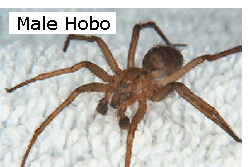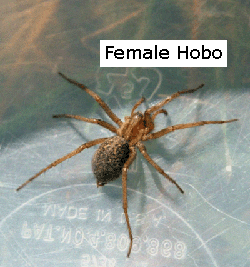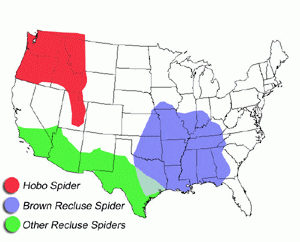Hobo Spider
(Aggressive House Spider)
(Aggressive House Spider)

This spider’s name comes from its method of very quickly expanding its distribution by hitching rides with humans along major highways in the Pacific Northwest. Formerly known as the Aggressive House Spider, their bite is of medical importance to both humans and pets because it may result in a slow-healing lesion.

The Hobo spider was first found in Seattle in the 1930’s and is common in the Pacific Northwest (Idaho, Montana, Oregon, Utah, Washington) and British Columbia.
The adult female length is about 7/16-5/8″; total size including legs about 1-1 3/4″ in diameter, with the male being slightly smaller. The color ranges from light to medium brown.
Hobo spiders may be found in almost any area containing holes, cracks, or crevices. They are poor climbers so are rarely found above ground level. They are frequently found in dark, moist areas such as basements, window wells, and crawlspaces.
Their webs may also be found in rock retaining walls, concrete cracks, tall grass, woodpiles, landscape timbers, and stones and rocks.

Hobo spider bites typically produce a lesion similar to that caused by a brown recluse spider. The bite produces a slight prickling sensation. Within 3 minutes or less, a small hard area appears which is surrounded by an expanding reddened area of 2-6″ in diameter. Soon the area blisters. After about 24 hours the blister breaks and the wound oozes. This crusts over to form a scab. Tissue beneath the scab may slowly die, and severe bites may require surgery.
It may take several months to heal and often leaves a permanent scar. Symptoms of a bite include a severe headache not helped by aspirin, nausea, weakness, muscle pain, and vision impairment. Many doctors attribute these lesions to the brown recluse spider, which does not occur in Washington state. Antibiotics do nothing to alleviate the effects of the venom, although they are often prescribed.